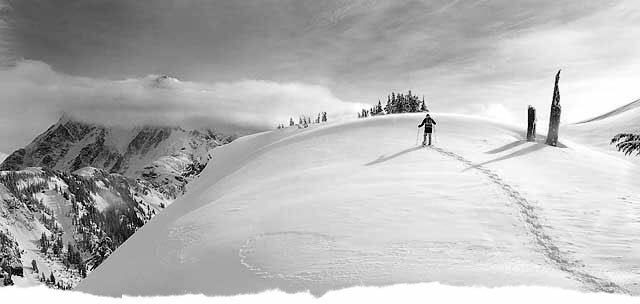 |
| TALK BACKThe communication rule to live by Story by Molly Baker Photo by Jefferson Morriss Many people have theories about what makes skiing, backcountry skiing in particular, a risky endeavor. My mom thinks the act of simply putting on skis catapults you into the danger zone. My boyfriend believes something like a 50-foot cliff might be the tipping point. The danger is ultimately relative, but the lessons we can learn from being in uncertain situations on skis are the same. A friend of mine who works as a ski guide says, “Good judgment comes from surviving bad judgment.” If you’re lucky enough to be granted a learning experience, one key factor always plays a critical role – communication. Two experiences have permeated my relationship with skiing and traveling in the backcountry. In both cases, everyone survived, and I’d like to hope that some skills to make better decisions were derived. For me, I recognize a lack of communication as the common factor. Often referred to as the human factor, the conversations about safety and our perceived safety are some of the most important skills we can pack into our arsenal of mountain equipment. SINGLED MINDED Two years ago in Argentina I found myself watching a ski partner wave as he skinned away from the group toward the boundaries of the ski area. Busy skiing, we casually watched him skin out of sight with the intentions of meeting at the car that evening. No details were communicated. By six o’clock that night, he hadn’t showed up. Unfamiliar with the terrain outside the area, we really had no idea of where he was or what kind of situation was possible. Had he been caught in an avalanche? Was he stuck in the backcountry with a broken leg? Or was he at the bar enjoying a steak and glass of Malbec? During the night I arranged a search-and-rescue team, who showed up at the ski area early with us the next morning. By this point, our worst fears seemed unavoidable. But, as we headed out onto the mountain, he came strolling into the village from where he had stayed the night before (without a phone number and no way to get down the mountain after a late arrival out of the backcountry, he had stayed with friends) trying to meet us as early as possible to let us know he was OK. Communication, especially when traveling in foreign countries where there is a language barrier in the case of necessary communication with emergency services, is one of the most important skills a skier can have when planning travel into the backcountry. Lesson learned. Or so I thought. But you can get into situations, of miscommunication or a lack of talking at all, in your own backyard. A year after the scenario in Argentina, I found myself skinning under the hanging glacier of Mt. Shuksan, chatting with the group about the amount of wind transport we were seeing above us as we commenced our mission up the grand mountain that lay before us. Once we got to the White Salmon Glacier the wind was so strong we couldn’t continue, so we decided to ski down. NO TRACKS During our climb, the conversation I was having with myself about the wind transport was alarming at best, but my efforts to communicate that sentiment were a failure. Group dynamics, the desire to keep going, and a number of other factors affected my ability to simply chat. As we skied down, we found our skin track buried by an avalanche that came from a starting point 4,000 feet above us in the Northwest Couloir. We survived the bad judgment and learned that all concerns, fears, and goals of a group need to be in constant conversation. Before, after and during a ski mission, each member of the party should always feel comfortable contributing to the ongoing dialogue. We talk about skiing with our friends all the time. Sometimes we just have to make sure those conversations count. Bring up your fears, voice your excitement and your goals, and never forget that speaking up will always make the situation better. X Molly Baker is a professional extreme skier and freelance writer who lives in Glacier when she’s not traveling the world. |